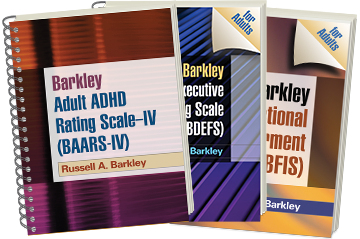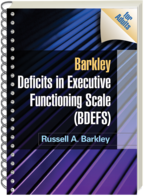Barkley Deficits in Executive Functioning Scale (BDEFS for Adults)
Russell A. Barkley
A Paperback Original
A Paperback Original
orderFebruary 1, 2011
ISBN 9781606239346
Price: $203.00 174 Pages
Size: 8" x 10½"
Convenient Wire Binding
Check out a special package offer including this title!

Read a Q&A with featured author, Russell A. Barkley!
Sign up for emails on upcoming titles by Russell A. Barkley (with special discounts)!
Sign up for emails on upcoming titles by Russell A. Barkley (with special discounts)!
The BDEFS is based on more than 16 years of research by the developer using a prototype of the BDEFS. The large normative sample (N>1,200) is representative of the U.S. population in terms of region, socioeconomic status, education, ethnicity/race, and gender, based on the 2000 U.S. Census. Scoring sheets present the percentiles for the normative sample by sex and age (18–34, 35–49, 50–64, and 65–81 years old). The normative sample is a true general population sample, not limited to those with an Internet connection and not excluding those with psychiatric disorders, psychiatric medication use, learning disabilities, neurological disorders, or serious medical illnesses.
Reliability
Reliability of the scores is quite satisfactory as evidenced by high internal consistency (Cronbach's alpha ranging from .91 to .95 scores across the five scales); good interobserver agreement (.66 to .79 across scales); and high test–retest reliability over a 2–3 week interval (ranging from .62 to .90 across scales and .84 for the Total EF Summary Score).
Validity
Validity of the scale scores was evident in numerous analyses, including factor analyses; correlations with other measures of EF; and correlations, regression analyses, and group comparisons concerning disorder discrimination and concurrent validity with various measures of functional impairment in major life activities (associated risks for ADHD, educational history, occupational functioning, social relationships, marriage, driving, financial management, crime and drug use, parenting stress, and offspring psychopathology, among other domains).
More extensive technical information is provided in the manual.
Reliability
Reliability of the scores is quite satisfactory as evidenced by high internal consistency (Cronbach's alpha ranging from .91 to .95 scores across the five scales); good interobserver agreement (.66 to .79 across scales); and high test–retest reliability over a 2–3 week interval (ranging from .62 to .90 across scales and .84 for the Total EF Summary Score).
Validity
Validity of the scale scores was evident in numerous analyses, including factor analyses; correlations with other measures of EF; and correlations, regression analyses, and group comparisons concerning disorder discrimination and concurrent validity with various measures of functional impairment in major life activities (associated risks for ADHD, educational history, occupational functioning, social relationships, marriage, driving, financial management, crime and drug use, parenting stress, and offspring psychopathology, among other domains).
More extensive technical information is provided in the manual.



